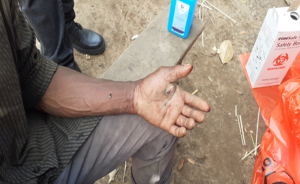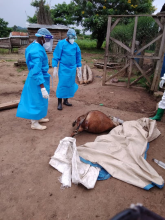Fighting Anthrax through mindset change on health seeking behaviour
In October and November 2023, Kyotera district, in southern Uganda, reported a ‘strange’ illness in different communities. Those who contracted the “illness” presented with blisters, fever, rashes, headache, muscle pain and swelling of limbs. In total, 75 people contracted the disease (17 confirmed, 07 probable, 51 suspected) and 13 lost their lives. The community, out of fear, hired a prominent leader of traditional healers in the region to help get rid of the misfortune, at a fee of 2.5 million shillings (about USD 640).
“The traditional healer attributed the misfortune to witchcraft by the family of one of our deceased community leaders. The community was incensed and insisted that his widow leaves the village. The widow contacted police, which in turn involved health authorities,” said Steve Kiggundu, the LC1 Chairperson of Kyemayembe village.
On 29 November 2023, with WHO’s technical support in the investigation and sample collection processes, health authorities in Kyotera district confirmed an outbreak of anthrax, a disease that is common in domestic animals, including cows, sheep, and goats. The government swiftly imposed restrictions on the movement of animals and consumption of animal products in the district.
The locals were hesitant to believe that anthrax was a medical condition. This mistrust greatly affected effectiveness and uptake of the initial interventions by health authorities. Following concerted efforts by the Ministry of Health with technical support from WHO, the locals started embracing positive health-seeking behaviour. The technical support covered anthropological interventions which included social behavioural insights study whose findings helped the response understand and demystify the beliefs and practices where over 70% of the affected households were seeking health services from shrines. WHO also supported targeted risk communication engagements with key influencers, affected families, key stakeholders and communities in the hotspots. This contributed to a turnaround in health seeking behavior from the shrines to health facilities by over 80% of the cases.
“We sensitized the communities, involving key influencers like community leaders, police, and traditional healers to change the community’s mindset. We wanted them to appreciate that in as much as there are conditions that they might be able to handle, anthrax is not one of them. They agreed to carry along information, education, and communication materials and display them at their places of work,” said Kintu E. Max, the Kyotera district Health Educator.
“Most people in our village don’t believe that someone can fall sick or die because of natural occurrences. Most of the misfortune is usually attributed to witchcraft. We were losing our colleagues and we wanted answers from our leaders on what was killing the people,” narrated Geoffrey Ssenkima, an anthrax survivor in Kyemayembe.
To boost the targeted engagements and promote health seeking from health facilities further, WHO mobilized and worked with survivors. Testimonies and sight of these survivors facilitated the community to appreciate anthrax as a preventable and treatable disease, but not witchcraft. Initially, there were false claims that whenever an infected person sought treatment at a health facility, they would pass on. However, after seeing survivors who were treated in health facilities, the locals started looking out for the signs and symptoms of anthrax, reporting suspected cases, and seeking treatment from health facilities.
“I was one of those who initially strongly resisted treatment in health facilities. However, after recovering, I decided to share the good news with the rest of the community,” said Ssenkima.
WHO also supported the efforts of the Government of Uganda and partners in building community structures, coordinating the response (response plan development, partner coordination and guiding district task force meetings), surveillance (field investigations, active case search, alert management) and laboratory systems (sample collection and management). Support was also extended to case management and infection prevention & control (capacity building of health workers).
“Outbreaks start and end in the community. Therefore, community participation is key to addressing public health emergencies. There is need for sustained investments in community interventions to ensure ownership and support in preventing, detecting, and responding to disease outbreaks,” said Dr. Yonas Tegegn Woldemariam, WHO Representative to Uganda.
Communications Associate
WHO Uganda Country Office
Email: afwcougcom [at] who.int (afwcougcom[at]who[dot]int)
Phone: +256740487734
Communications Officer
WHO Uganda
Email: tcheutchouae [at] who.int (tcheutchouae[at]who[dot]int)

